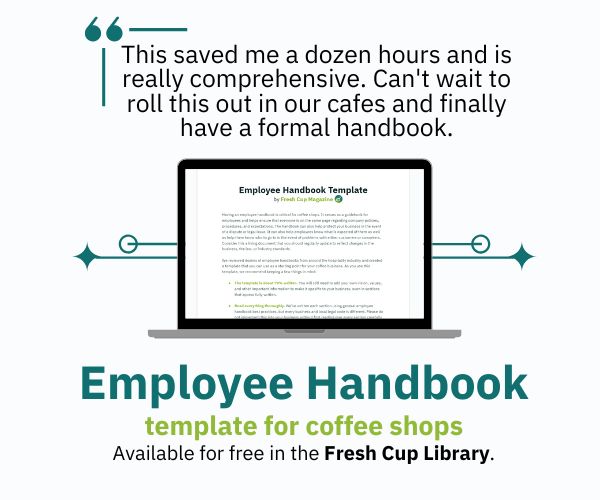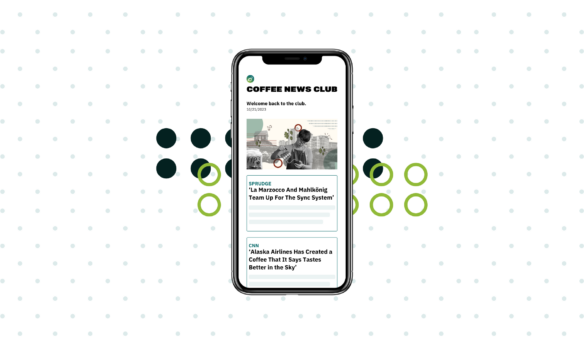Could better-tasting, more climate-resilient coffee be in our future? Plus, a raging debate over alternative milk at barista competitions and your favorite Starbucks hacks pour money into the company’s coffers.
A lot of news this week, so let’s jump in!
‘WCR Launches Landmark Global Coffee Breeding Program Innovea’ – via Daily Coffee News
World Coffee Research (WCR) has announced the launch of Innovea, a new global breeding network that aims to accelerate the pace of coffee development in the face of a rapidly-worsening climate crisis.
Innovea, launched in Costa Rica at this year’s Sintercafe expo, aims to bring new genetic materials, training, and tools to researchers globally. Long-term, WCR hopes to produce new varieties that are more resilient, productive, more diverse, and better tasting than those currently available.
“Coffee faces a crisis of innovation that makes the industry’s sustainability, quality, and supply assurance goals impossible to achieve if we stay on the path we are on,” WCR CEO Dr. Jennifer (Vern) Long said in the announcement. “But as we have seen with Covid-19, incredible solutions to urgent, global problems are made possible with scientific collaboration.”
Funding comes from WCR’s network of over 200 members, including some of the biggest coffee companies in the world. Alongside Costa Rica, the other participating countries are India, Indonesia, Kenya, Mexico, Peru, Rwanda, Uganda, and the United States—together, they make up nearly a quarter of the world’s arabica coffee exports. The collaborative nature of the program is designed to lower the cost of accessing modern breeding tools while providing diverse environmental research conditions.
“Accelerating the development of better varieties is absolutely essential for tackling climate change,” Dr. Long continued. “We have to do it and we have to start today. If we don’t, in 20 years, farmers will have left coffee for more productive crops and we will be left drinking synthetic coffee.”
‘Climate-resistant Coffee Trees Could Save Mozambique Rainforest’ – via Reuters
In Mozambique’s Gorongosa National Park, climate-resilient coffee trees could benefit local communities and slow rainforest deforestation.
Over 800,000 coffee trees have been planted in the park, benefiting 800 farmers and protecting an area that loses 100 hectares of rainforest annually.
Once considered one of Africa’s finest national parks, Gorongosa was heavily impacted by Mozambique’s civil war between 1977 and 1992, which killed more than a million people and wiped out much of the park’s large mammals. A public/private partnership has, since 2004, launched several initiatives that have rejuvenated the wildlife population and, with the coffee project, provided income for residents and protection for the rainforest.
Climate change poses a significant threat to Mozambique. Park officials have been researching more resilient coffee varieties that it hopes can withstand the increased droughts and cyclones that afflict the country. “Sometimes (there is a) very long rainy season, sometimes very short,” Park warden Pedro Muagura told Reuters. “We want to try to have species which can cope.”
‘Barista Competitor Writes Open Letter To SCA Germany To Allow Alternative Milks’ – via Sprudge
Did you know that the Specialty Coffee Association does not allow competitors to use alternative milk in its coffee competitions? No soy? No oat?
It’s true. According to the rules, competitors can only use cow’s milk, a rule that seems slightly outdated when almost every coffee shop stocks at least one alternative milk.
A German-based barista competitor hopes to change that. Mikolaj Pociecha, representing Suedhang Coffee, competed in the German Barista Championship using oat milk. In an open letter to the German chapter of the SCA, posted to Suedhang Coffee’s Instagram page, Pociecha and Suedhang call for the organization to publicly state that it will “refrain from the compulsory use of cow’s milk at all upcoming competitions.”
As justification, the writers state: “The Rules are contrary to our ethical compass: they discriminate against people with vegan diets, give a false image of the barista profession, humiliatingly force participants to work with animal products on a public stage and imply a huge waste of resources.”
The writers also threaten the German SCA with legal action unless changes are implemented. The post received hundreds of comments, and it’s the threat of legal action that seems to have caused the most consternation—national SCA chapters are volunteer-run, and many commenters say that any legal action would be financially impossible to meet. The organization has yet to comment on the letter.
This isn’t the first time the cow-only rule has been challenged. Sprudge covered a similar protest at the 2019 Canadian Barista Championship: competitor Chris Tellez used oat milk in his routine and was disqualified.
Read the full story (including the entire open letter) here.
‘Starbucks’ Beverage Modifiers Become a $1B Business’ – via Restaurant Business
You know that Starbucks menu hack you saw on TikTok? How about that no whip, extra foam, two pumps of raspberry syrup, three scoops of Frappuccino powder hot mocha served over ice you surreptitiously ordered on the Starbucks app, carefully avoiding any eye contact with baristas as you shuffle to the counter to pick up your drink?
They’re all adding up to more profit for the company, adding $1 billion in extra revenue while making the workers’ lives harder.
Secret menu items and drink hacks have become increasingly popular recently, fueled by the anonymity of app-based ordering and social media influencers who order ever more complicated drink concoctions and post the results.
And it’s all part of Starbucks’ plan. “Our cold customized beverage strategy is working,” Sara Trilling, president of Starbucks North America, told investors. Cold drinks accounted for more than three-quarters of all the company’s beverages last quarter, and sixty percent of those were customized—doubling its revenue from such modifiers.
Starbucks has been investing in new technology to speed up the drink-making process, partly due to the increased demand for cold beverages.
Meanwhile, baristas are suffering, juggling the complexity and absurdity of hacked drinks. Many patrons assume Starbucks employees know what they mean when they order drinks born on TikTok or other social media platforms. Of hacked drinks, one Starbucks employee told Eater: “It brings me to a screeching halt, trying to figure out what they want, how to make it, actually making it, and more times than not, remaking it, both because I messed up somewhere or because the person sent it back, either because it didn’t look like the pictures they had or because they didn’t like the taste.”
More News
‘SCA Carbon and Coffee Report Calls for Greenhouse Gas Reductions’ – via Daily Coffee News
‘Two South Korean Miners Rescued After Surviving for Days on Coffee Powder’ – via the Guardian
‘The New Linea Micra Home Espresso Machine By La Marzocco’ – via Sprudge
‘UK Restaurant and Coffee Prices Rise by Up To 26% in Two Years’ – via the Guardian
‘Olam Specialty Coffee Changes Name to Covoya’ – via Daily Coffee News
The Week in Coffee Unionizing
A piece in Restaurant Dive examines the issues facing Starbucks Workers United as it looks to sustain momentum nearly a year after its first union win.
The union is in a race against time to reach bargaining agreements with the company, as decertification elections can begin one year after a victory, a deadline that is steadily approaching. Under certain circumstances, workers can vote to decertify an election—unless a collective-bargaining agreement is reached.
Bargaining has been contentious, with both Starbucks and the union accusing each other of failing to approach negotiations in good faith. Starbucks has walked out of or flat out refused to attend several meetings, leading SBWU to file “failure to bargain” charges, while the company has refused to agree to hybrid bargaining, where some members join via Zoom.
Although the union’s momentum might be slowing, it has won some big victories—Starbucks has this year raised wages and increased benefits for non-union employees, a move the union has taken credit for.
Away from Starbucks, workers at Brooklyn, New York coffee shop The Daily Press have filed for unionization. The move came after the owners unexpectedly cut opening hours—and with it employee hours—leaving workers unsure if they could pay rent. “I think it is incredibly telling that our entire staff has formed this united front,” barista Amber Crabb said. “When hours were cut, every employee had the right to think, ‘That’s not my problem!’ and find work elsewhere. We all see a fostered community that is absolutely worth preserving.”
Is Coffee Good For You?
According to a new meta-analysis, drinking coffee could be associated with a higher risk of developing coronary heart disease among men.
Published in the American Journal of Cardiology, the meta-analysis—where the results of multiple studies are combined and analyzed—looked at data from 32 studies from 1977 to 2020, including more than 2.2 million patients. While scientists found “no significant association” between consuming coffee and coronary heart disease (CHD), things changed once they broke their analysis down by gender.
The meta-analysis showed both positive and potentially negative associations, researchers wrote. “Coffee consumption significantly increased the risk of CHD in men, and statistically nonsignificantly decreased it in women.”
Looking for a reason, the researchers landed on sex hormones as a potential explanation. High levels of LDL (low-density lipoprotein) cholesterol can raise your risk of heart disease. Sex hormones such as estrogen and progesterone are known to protect against such levels.
“Thus, although coffee consumption increases the lipid levels in both genders,” the researchers wrote, “women might have protection against the effects of high lipid levels and a lower risk of CHD than men.”
Beyond the Headlines
‘The Quest to Make the Best Worst Cup of Coffee’ by Alina Simone
‘Howard Schultz Hasn’t Won His Anti-Union Fight at Starbucks’ by John Logan
‘Cxffeeblack’s Mission to Decolonize the Coffee Industry’ by Kelly Pau
Coffee News Club is written by Fionn Pooler and the Fresh Cup editorial team.















